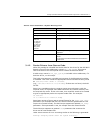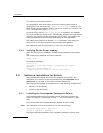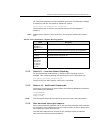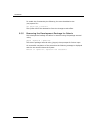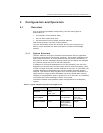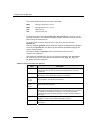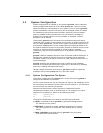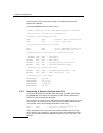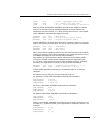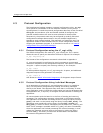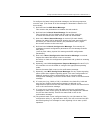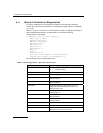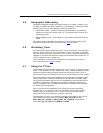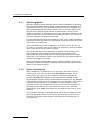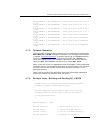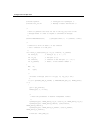
Dialogic
®
DSI SPCI Network Interface Boards Programmer's Manual Issue 5
23
LOCAL 0xcf * s7_mgt - Management/config task
LOCAL 0x2d * upe - Example user part task
LOCAL 0x3d * s7_log - Prints messages to screen/file
After the LOCAL declarations, REDIRECT commands are added for modules
that run on the board so that messages destined for these modules are
transported via ssds (module_id = 0x20) and the device driver, to the board.
These REDIRECT commands are always required:
REDIRECT 0x71 0x20 * MTP2 module
REDIRECT 0x10 0x20 * CT bus/Clocking control module
REDIRECT 0x8e 0x20 * On-board management module
Further REDIRECT commands are required for protocols chosen to run on the
board. This typically includes MTP3 and one or more user parts. For example:
REDIRECT 0x23 0x20 * ISUP module
REDIRECT 0x4a 0x20 * TUP module
REDIRECT 0x22 0x20 * MTP3 module
Next, ensure status indications issued from the board can arrive at a module
running on the host. (If this does not happen, the system will quickly run out
of available messages for inter-process communication).
Two module_id's (0xdf and 0xef) require redirection to a suitable process
running on the host. Initially these messages should be redirected to the
s7_log utility, which prints out a line for each message received. Ultimately,
the user's own application will expect to receive these notifications.
REDIRECT 0xdf 0x3d * LIU/MTP2 status messages -> s7_log
REDIRECT 0xef 0x3d * Other indications -> s7_log
Include FORK_PROCESS commands for all modules that run on the host
computer.
All systems require ssds, tim, and tick modules to be run.
For Windows
®
, these FORK_PROCESS commands are mandatory:
FORK_PROCESS ssds.exe
FORK_PROCESS tim_nt.exe
FORK_PROCESS tick_nt.exe
For Linux, these FORK_PROCESS commands are mandatory:
FORK_PROCESS ssds
FORK_PROCESS tim_lnx
FORK_PROCESS tick_lnx
For Solaris, these FORK_PROCESS commands are mandatory:
FORK_PROCESS ssds
FORK_PROCESS tim_sol
FORK_PROCESS tick_sol
Finally, include FORK_PROCESS commands for any modules chosen to run on
the host (e.g., protocol modules, user's application or diagnostic utilities). For
example:
FORK_PROCESS s7_mgt
FORK_PROCESS upe
FORK_PROCESS s7_log



